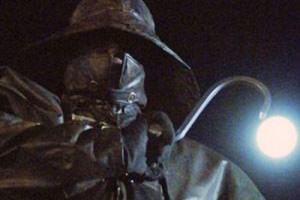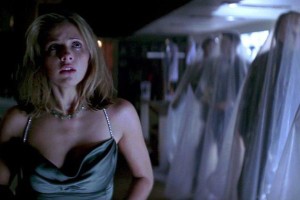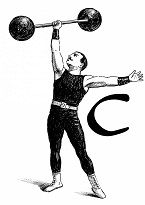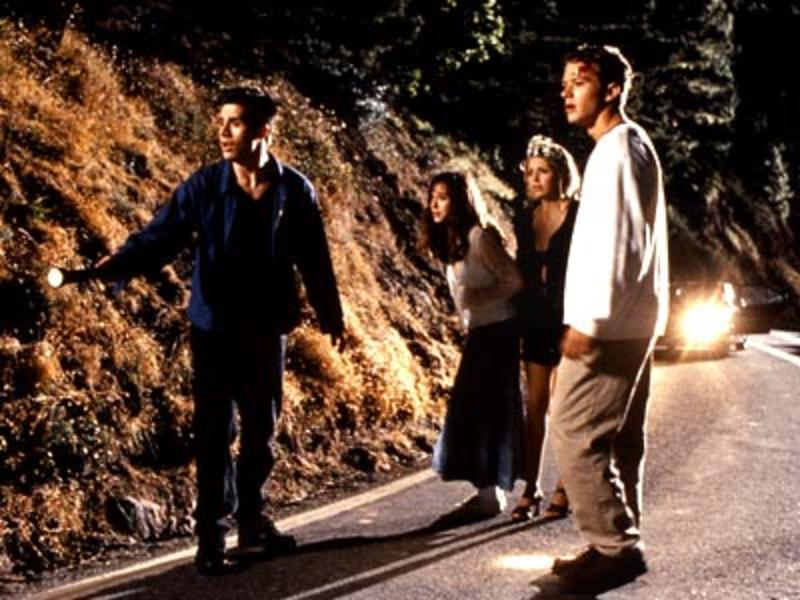As far as horror movie genres go, the all-star-teenage-cast-gets-butchered M.O. is about as staple these days as Redbox kiosks in your local Wal-Mart. And it’s not hard to understand the appeal: a bunch of attractive adolescents engage in risky behavior, garner the unfortunate interest of a psychopathic lunatic, and are butchered one-by-one until the inevitable confrontation at the end. It’s the stuff of terror – and hopefully a few laughs along the way. And while nowadays these movies are a ubiquitous addition to any movie store shelf, there always has to be a first. Not the best, but by no means the worst of its ilk, 1997’s “I Know What You Did Last Summer.” while suffering from weak plot and marked overacting from all involved, manages to bring some genuine scares to the table.
“I Know What You Did Last Summer” is like an episode of “Dawson’s Creek” on crack. The movie opens at a seafood festival in North Carolina, and we are quickly introduced to the characters. There’s Barry and Ray (Ryan Phillippe, “Cruel Intentions,” and Freddie Prinze, Jr, “She’s All That”) and Julie and Helen (Jennifer Love-Hewitt, “Party of Five” and Sarah Michelle-Geller, “Buffy”). Ray’s dating Julie and Barry’s dating Helen; after Helen gets crowned “Croaker Queen” of the small town festival, the foursome head down to the local beach to get drunk, and, it seems, tell ghost stories.
The story on hand? Ray tells the story of an escaped lunatic with a hook for a hand, that goes around interfering with all the nice kids just looking for a place to make out, murdering unsuspecting teens during their greatest moment of pleasure. “Now that’s the real story. That’s the way it really happened,” Ray mutters. However the girls are not so sure. And neither is Barry.

“None of it really happened. It’s a bullshit ghost story to begin with,” he says.
From there the movie accelerates toward its breakneck plot. The foursome, driving home in Barry’s car, end up running over a man crossing the highway in the middle of the night, leaving massive skid marks in the middle of the road and coming to a panicked halt. In a quick diagnosis Barry declares they guy dead, and they need to figure out what to do.
It is here that the movie’s tension suffers, taking what could have been an ominous and offbeat scene and inserting massive overacting that takes away from its ultimate effect. The foursome discusses, rather heatedly, what to do with the body. Go to the police? No, Barry says. Leave it and drive away? Julie protests this – it’ll be a hit and run. So, against Julie’s wishes, the three convince her to help them dump the body in the ocean, hoping little critters will eat him to pieces or hopefully wash him out to sea.
As evidence of this overacting, look no farther than an interaction between Barry and Ray. “It would be weeks before they found the guy,” Barry says. “If they found him at all,” Ray says ominously. Unfortunately the effect comes off more contrived and stilted than the filmmakers might have hoped.
After getting rid of the body, the four make a pact to never talk about the events of the evening to anybody, rendering the proceedings to, as Barry calls it, “merely a future therapy bill.”
 However it is not to be. A year later, on the eve of her return home for the summer from college, Julie gets an anonymous letter in the mail with the words “I Know What You Did Last Summer” scrawled across it. A friend of Julie’s, Max (Johnny Galecki, “Big Bang Theory”) is murdered by a mysterious fisherman with a hook, Barry is assaulted with a car, and thus begins the foursome’s fight for their lives against a madman with one huge axe to grind chasing them at every turn.
However it is not to be. A year later, on the eve of her return home for the summer from college, Julie gets an anonymous letter in the mail with the words “I Know What You Did Last Summer” scrawled across it. A friend of Julie’s, Max (Johnny Galecki, “Big Bang Theory”) is murdered by a mysterious fisherman with a hook, Barry is assaulted with a car, and thus begins the foursome’s fight for their lives against a madman with one huge axe to grind chasing them at every turn.
Some of what works about “I Know What You Did Last Summer” lies in the believable progression of the characters in the film. At the beginning, the four are carefree, throw-caution-to-the-wind types; by the time the killer surfaces, their lives are falling apart, wracked with the guilt of one wrong decision they made last summer, which is jointly destroying them.
However, this progression isn’t as easy for all of them. Sarah Michelle-Geller does a fairly good job at playing the washed up princess of last year’s festival,and Jennifer Love-Hewitt does likewise as a guilt-wracked teen hiding from her problems. However, issues lie with the guys. Prinze, Jr.’s Ray, who has followed in his father’s footsteps and become a fisherman, just doesn’t pull off the act, appearing more GQ model than blue collar worker. Likewise Phillippe almost tries too hard to turn Barry into a bigger jerk than he was in the opening scenes. While this might have been believable, the closeness between the four offered in the opening scenes of the movie – coupled with the utter contempt Barry seems to feel for the other three in the present – just doesn’t add up.

One of the other problems with the movie lie with the killer. The “fisherman” (Muse Watson, “Prison Break”) is under-developed, and lacks the terror or suspense offered in better movies of the genre, such as “Halloween” or “Friday the 13th” – he simply shows up, kills this person or that, and then vanishes. Likewise, the reveal of his true identity at the end, and his explained motive, while plausible, just isn’t that interesting. The movie simply explains away all the terror by giving a ground-in-reality, believable M.O. Has Hollywood forgot it’s scarier when there’s no motive?
But all is not lost. At the end of the day, you could do worse than “I Know What You Did Last Summer.” It’s not great, but it’s good, and if it doesn’t scare you will probably at least entertain. As a word of caution, don’t rent the film expecting a fright-fest on par with “Psycho,” “A Nightmare on Elm Street,” or even “Scream” (Kevin Williamson, writer of “Scream” also penned “I Know What You Did Last Summer”). It has it’s moments and it’s ups and downs. Do rent it if you want a good cheap scare to pass Halloween night with; don’t rent it if you want something to challenge the horror genre and keep you up all night.
“None of it really happened. It’s just a bullshit ghost story to begin with.”
Well put, Barry. Well put.
-by Mark Ziobro


